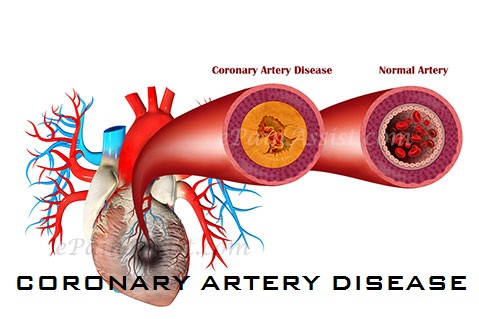Coronary Artery Disease (CAD) … The silent killer

Coronary artery disease (also known as CAD or Coronary Arteriosclerosis), is the most common type of heart disease. It is the leading cause of death in the many countries affecting both the male and female gender.
CAD happens when the arteries that supply blood to heart muscle become hardened and narrowed. This is due to the buildup (atherosclerosis) of cholesterol and other material on their inner walls or one can simply say it is a result of plaque buildup in your arteries. As it grows, less blood flows through the arteries depriving the heart muscle from the supply of blood or oxygen it needs. With time, the plaque could rupture, leading to chest pain (angina), heart attack or sudden cardiac death. Most heart attacks happen when a blood clot suddenly cuts off the hearts' blood supply, causing permanent heart damage.
Over time, CAD can also weaken the heart muscle and contribute to heart failure (the heart can't pump blood well to the rest of the body) and arrhythmia (changes in the normal beating rhythm of the heart).
How Does Coronary Artery Disease Develop?
This starts from a tender age, as plaque can start to go into your blood vessel walls. As one ages, the plaque builds up. That inflames the walls and raises the risk of blood clots and heart attacks.
The plaque makes the inner walls of your blood vessels sticky. Then, other things, like inflammatory cells, lipo-proteins, and calcium, travel in your bloodstream and mix with the plaque. As more of these inflammatory cells join in, along with cholesterol, the plaque increases, both pushing the artery walls outward and growing inward. That makes the vessels narrower.
Eventually, a narrowed coronary artery may develop new blood vessels that go around the blockage to get blood to the heart. However, if you’re pushing yourself or stressed, the new arteries may not be able to bring enough oxygen-rich blood to the heart muscle. If a blood vessel to the brain is blocked, usually from a blood clot, an ischemic stroke can happen.
If a blood vessel within the brain bursts, most likely as a result of uncontrolled hypertension (high blood pressure), a hemorrhagic stroke can result.
DIETS
Foods that are recommended and advised against: Those foods recommended in this table contribute significantly to the control of CAD and the avoidance of its complications. They should therefore be included in any dietetic plan established by a specialist. Those foods whose use should be reduced or eliminated have been shown to initiate or exacerbate CAD.
TO REDUCE THE RISK OF CAD, ONE MUST
REDUCE OR ELIMINATE THE INTAKE OF:
Potato chips, French fries, and other “junk” foods
Vegetables cooked in butter, cheese, or cream sauces
Fried foods, Whole milk, Bacon, sausage, and organ meats (like liver)
Egg yolks, Cheesecake, pastries, doughnuts, ice cream, Butter and margarine.
INCREASE THE INTAKE OF:
Whole-grain breads and pasta, brown rice, whole-grain bagels
Fresh, frozen, baked, or steamed fruits and vegetables
Steamed, baked, or fresh foods.
Fat-free milk, Fish, skinless poultry, lean cuts of meat (with fat trimmed away), soy products
Egg whites, egg substitutes, Angel food cake, fig bars, animal crackers, graham crackers, air-popped popcorn, low-fat frozen desserts (yogurt, sherbet, ice milk)
NOTE:

• Kidney beans, and navy beans have been shown to reduce cholesterol levels.

• Olive oil or canola oil that are known to be high in high in monounsaturated fat.

• Garlic reduces low-density lipo-protein (LDL) cholesterol levels and lowers blood pressure.
Finally, remember to start your day out right. Have some kind of grain (like whole-grain bread or whole-grain cereal) and fruit for breakfast.
OTHER THINGS YOU SHOULD DO:
Besides changing your diet, you should talk to your doctor about an exercise program that is right for you. If you smoke, quit. If you are overweight, try to lose weight (changing your diet and exercising will help you lose weight). Talk with your doctor about reducing other risk factors, such as high blood pressure or diabetes.
Also, Studies have found that taking low-dose aspirin each day may help prevent heart attacks and strokes in people who are 50 or older and at risk for heart disease.
PREVIOUS TOPICS
UPCOMING TOPICS
...Know your health status... go see your Doctor...